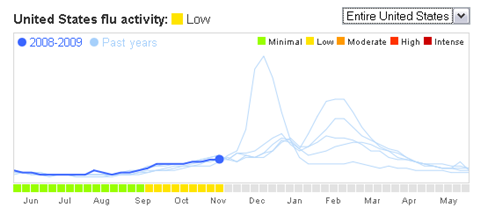Google helps CDC track flu clusters

Google will work with the Centers for Disease Control to track flu trends. The game plan: Capture data on searches related to flu, chest congestions and colds and report back to the CDC.
Google made the announcement in a blog post.
The Drudge Report reported the story with a little Big Brother flair, but you have to admit that information can be useful to the CDC. If there's a breakout of influenza in Birmingham, Alabama chances are Google would know before the CDC.
All that's fine, but the Google-CDC collaboration could be viewed as a bit creepy although I might appreciate the Thera-Flu ad that would inevitably run near my search. Individuals wouldn't be tracked.
Google explains:
Last year, a small team of software engineers began to explore if we could go beyond simple trends and accurately model real-world phenomena using patterns in search queries. After meeting with the public health gurus on Google.org's Predict and Prevent team, we decided to focus on outbreaks of infectious disease, which are responsible for millions of deaths around the world each year. You've probably heard of one such disease: influenza, commonly known as "the flu," which is responsible for up to 500,000 deaths worldwide each year. If you or your kids have ever caught the flu, you know just how awful it can be.
Our team found that certain aggregated search queries tend to be very common during flu season each year. We compared these aggregated queries against data provided by the U.S. Centers for Disease Control and Prevention (CDC), and we found that there's a very close relationship between the frequency of these search queries and the number of people who are experiencing flu-like symptoms each week. As a result, if we tally each day's flu-related search queries, we can estimate how many people have a flu-like illness. Based on this discovery, we have launched Google Flu Trends, where you can find up-to-date influenza-related activity estimates for each of the 50 states in the U.S.
The CDC does a great job of surveying real doctors and patients to accurately track the flu, so why bother with estimates from aggregated search queries? It turns out that traditional flu surveillance systems take 1-2 weeks to collect and release surveillance data, but Google search queries can be automatically counted very quickly. By making our flu estimates available each day, Google Flu Trends may provide an early-warning system for outbreaks of influenza.
The question to you: Is this useful or too Big Brother-ish? I'm opting for the former.
